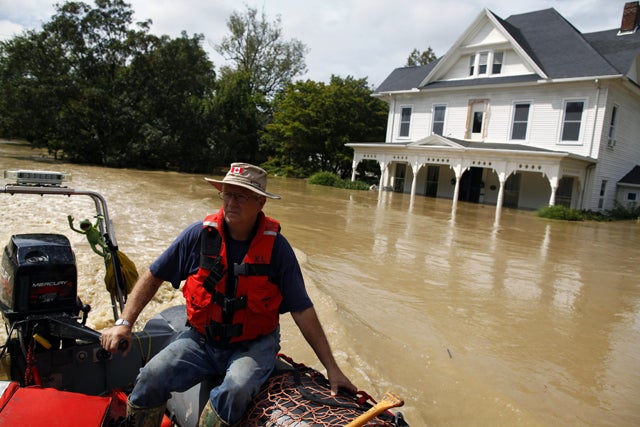Hurricane Irene and Tropical Storm Lee may have ravaged northeastern Pennsylvania with floodwaters, but displaced people have found aid and comfort in the relief provided by private charities and businesses.
A recent New York Times story described affected people’s disillusionment with the federal government’s ability to dispense disaster relief aid through FEMA. “Uprooted and desolate, hard-working people in this part of the country expect a bit more from their government,” the Times reported.
The story failed to mention the outpouring of food, furniture and housing repair assistance provided by charities and companies. It also neglected the immediate help offered by neighbors and community organizations, which were on the scene before FEMA.
According to Connie Pheiff, CEO of the Wyoming County United Way, she’s received more than 2,000 applications for housing assistance. The United Way will provide vouchers to replace damaged home items like refrigerators, washers and dryers, appliances, sheetrock, gravel for driveways and sand for basement repair.
Local energy companies such as Chief Oil and Gas and Tug Hill Inc. stepped up to the plate and made a joint commitment of $250,000 to aid families and communities ravaged by the flooding.
“So many people in Northeast Pennsylvania have been affected by this terrible flooding, including Chief employees and landowners, as well as our friends and neighbors,” said Kristi Gittins, vice president of industry and public affairs for Chief. “We felt it was important to come together as a community and provide assistance wherever we could.”
The companies also aided helped with fuel costs, debris removal and food and shelter items, in addition to making donations to local fire departments and other disaster relief organizations.
“These were the same companies that were doing the hydrofracking. They called me at 4 a.m. and asked me if I needed anything,” said Pheiff, praising their efforts. “I told them, ‘Right now we need manpower, we need heavy equipment machinery, and we need dumpsters.’ They had the men and women on the street within hours.
“I was able to organize it within different points of the county, and every point in the county had somebody there from the gas company and also Procter & Gamble,” Pheiff continued. “What the gas company did was they actually shut down operations for I believe four days to allow their people to get out and help those that were affected by the disaster.”
Chesapeake Energy, another company working in the area, also provided critical aid to emergency responders.
“We worked closely with local emergency responders and nonprofits to identify and help meet needs for materials, services and financial support,” the company said in a statement. “All told, Chesapeake, its employees and contractors provided thousands of hours of volunteer assistance, the use of dozens of heavy vehicles and equipment to efficiently clean up and clear debris, $35,000 in emergency assistance funds to local charities, cleaning supplies and water throughout the region over approximately a two-week period.”
Other groups, such as the Weinberg Northeast Regional Food Bank, coordinated food aid relief.
“We received donations of 233,863 pounds and have already distributed over 176,759 pounds,” said Gene Brady, the food bank’s executive director. Brady noted that donations were provided by Community Food Bank of New Jersey, Procter & Gamble, Wegmans Food Market, Nature’s Way and Vermont Emergency Management. Brady said the food bank transports the goods to disaster recovery locations by way of mobile pantries.
“As people go back to their homes,” said Brady, “many of them are going to be without food that they had before that they’re going to be forced to throw away — they’ve probably already done that if it was in a refrigerator. Canned goods, and dry goods, for many of them are all lost.”
The outpouring of support has been overwhelming. Pheiff noted, for example, that she was looking for a warehouse in nearby Scranton to hold the donations until families were ready for them.
“We have people still living in shelters, still living in tents. Winter is right around the corner, and this isn’t a quick fix. … We have people who have nothing,” Pheiff said. “The more money we raise, the more money will give right back to the community.”




























